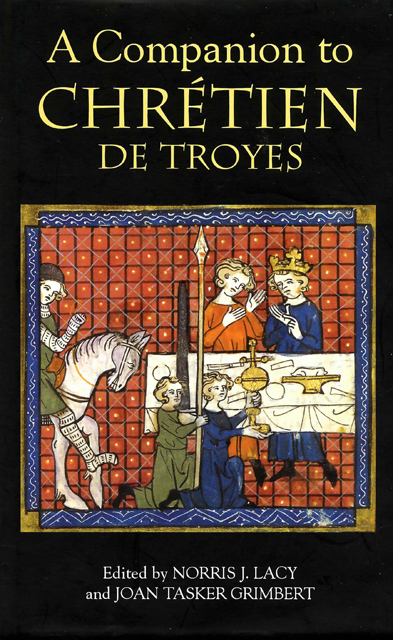10 - Cligés and the Chansons: A Slave to Love
Published online by Cambridge University Press: 23 March 2023
Summary
Chrétien's versatility was such that each of his romances could be said to stand apart from the others. Yet Cligés probably deserves that characterization more than any other, considering its many distinctive features: the prologue vaunting the author's achievements and the pre-eminence of France's culture; the distinctive treatment of Arthur (a warrior) and his court (famous, but peripheral at best); the dominance of Byzantium both as background and source material; the existence of two heroes and two heroines; the unusually large proportion of passages devoted to warfare; the near disjunction between prowess and love; the preponderance of supremely rhetorical monologues and dialogues devoted to love; and a narrator whose ironical stance is so highly developed that it is difficult to ascertain how the author feels about the cast of characters he has created for this bizarre reworking of the legend of Tristan and Ysolt.
For the student and the casual reader, Cligés is undoubtedly the least appreciated of the romances; yet, in many ways, it is the key to understanding Chrétien's artistry. Not only is it ‘an exercise in virtuosity and literary prowess’, it is also a work of intricate intertexuality where the concept of craft is foregrounded, bringing together all the threads of the romance tradition. Moreover, it is the romance that reveals most clearly Chrétien's debt to the troubadours and the link with his beginnings in lyric poetry. For this reason, in my discussion of Cligés is embedded an analysis of Chrétien's two chansons courtoises (love lyrics). Of necessity, I have allowed the martial exploits of the two heroes to be eclipsed here by the marital issues. A brief summary of the romance will help situate the various aspects of the work discussed below.
Chrétien presumably modelled this bipartite romance after Thomas's Roman de Tristan: the story of Cligés is preceded by that of his father, Alixandre, elder son of the emperor of Greece and Constantinople. Alixandre, desirous of proving his worth, asks for leave to visit the most renowned court of the time, King Arthur’s, where he is warmly received. Arthur soon sails for Brittany, leaving his kingdom in Count Angrés's hands. During the crossing, Alixandre falls in love with Gauvain's sister, Soredamors, who, normally disdainful of love, soon realizes that she is enamoured with him. Both wish to reveal their feelings but dare not.
- Type
- Chapter
- Information
- A Companion to Chrétien de Troyes , pp. 120 - 136Publisher: Boydell & BrewerPrint publication year: 2005

